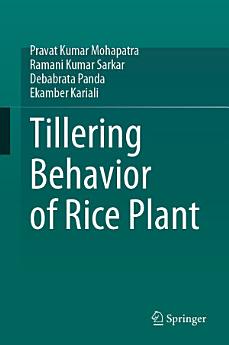Tillering Behavior of Rice Plant
About this ebook
Rice grain is a complex carbohydrate used as a primary food energy source. This book focuses on the impact of high-rise consumer demand on accelerating grain production and ensuring societal stability. Wide coverage is given to variation in rice cultivation under unstable and sharply differing environments, where soil moisture level dictates plant phenology exaggerating tillering dynamics. The book provides essential information for environment-specific regulation of plant growth, tiller number, growth pattern, and manipulation of tiller dynamics for yield. Authors have also elucidated molecular biology underlying tiller survival, the origin of rice and factors crucial for evolutionary change of plant type devoted to imaging a designer plant type. The book includes topics on the ecology of rice environment, cultural types, ontogeny of tiller formation, tiller classes, genetic control of tillering and physiology of tiller growth.
A comprehensive account of tiller dynamics resilient to climate change helps students and researchers learn and gain skills to achieve optimum rice yield. This book is important to students, teachers, researchers and climate change scientists. Further, it serves in designing and shaping rice production in the disintegrating rice agroecosystem under the impact of climate change.
About the author
Dr Pravat Kumar Mohapatra (corresponding author) obtained PhD (Plant Physiology) from University of Adelaide. He joined School of Life Science, Sambalpur University and superannuated as professor in 2008. Post-superannuation, he served as CSIR and UGC emeritus scientist. His epoch-making research on rice yield potential earned him distinctions in India, Australia, China, Japan and IRRI, Philippines.
Dr Ramani Kumar Sarkar obtained PhD (Botany) from University of Calcutta. He joined Agricultural Research Service, ICAR and superannuated as Principal Scientist, ICAR-NRRI, Cuttack. Post-superannuation, he was emeritus scientist till 2020. He achieved reputations in India, CIMMYT, Mexico and IRRI, Philippines for research on drought, salinity, and submergence tolerance.
Dr Debabrata Panda was Scientist-B at Rubber Research Institute of India before joining faculty at Central University of Odisha, Koraput in 2012. His research interests include physiology of abiotic stress tolerance in plants. He contributed to collection, evaluation and popularization of indigenous wild crops strengthening tribal food security.
Dr Ekamber Kariali joined School of Life Sciences, Sambalpur University as Lecturer in 1997 and obtained PhD in Life Science (Plant Physiology). He became Professor in 2017. He specializes in rice tiller dynamics. He made significant contributions to biodiversity of indigenous rice cultivars and their utility for mankind.




